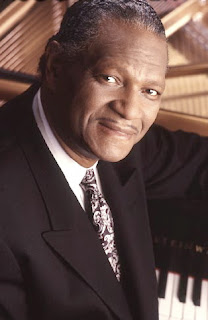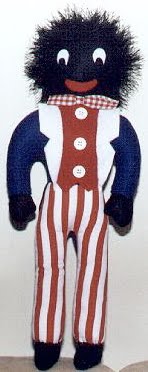 Finally, I present the rest of a 2004 conversation between the great pianist McCoy Tyner and jazz writer Andrew Gilbert. (Here’s the first part.)
Finally, I present the rest of a 2004 conversation between the great pianist McCoy Tyner and jazz writer Andrew Gilbert. (Here’s the first part.)Also, on my Vox blog I’m streaming “Contemplation” from Tyner’s classic 1967 Blue Note LP, “The Real McCoy.”
And the very best treat of all: Click here to see young Mr. Tyner with the John Coltrane Quartet playing “Afro Blue” on television in 1963. Hot damn!
ANDREW GILBERT: You were doing a fair amount of composing when you were with Coltrane. Did you ever try to get your tunes into the band’s book?
McCOY TYNER: John did one of my songs. But the thing is, I didn’t want to get into that, “Why don’t you do my songs?” (chuckles) I was there to learn and to appreciate, and I was eager to find out what he had in mind.
He was on sort of a mission musically, especially after he left Miles and had his own band. John had his own ideas and his own vision, and I wanted to see what that was and see what I could contribute to that music. I wasn’t prepared to submit my music to him.
He did do a couple though. We recorded my tune “Aisha” that I wrote for my wife.... He was very generous when it came to stuff about that, but I never forced it. I was there to learn. I was a student and I wanted to graduate. (laughs)
GILBERT: Tracking the development of the quartet’s sound, it seems like the band was perpetually experimenting, trying out new ideas to see where they might lead.
TYNER: John was like a scientist in a laboratory. He was always thinking of something else and experimenting. He definitely had a spiritual/scientific approach to music, constantly searching, developing.
He would bring a song in and I’d really like it, and the next day I’d say, “How about that song we played last night?” And he’d say, “Well, I kind of put that way.”
But there were songs we’d always play – “My Favorite Things,” “Chim Chim Cheree,” “I Want To Talk About You.” He always had his favorites. I just loved his commitment to the music. He was so committed and hard-working. It was such a monumental experience being in that environment for that many years, almost six years. So much got done, because of the commitment.
When the leadership is committed, the tendency is to go along and try to learn as much as you can. It was a wonderful place to grow up.
GILBERT: Your first albums were for Bob Thiele at Impulse. But it seems like you really came into your own at Blue Note.
TYNER: Bob Thiele got me started. He said, “Look, why don’t you start recording under your own name?” That’s a good idea. So I owe that to Bob. I was ready. ... I’d made all these recordings with John and it was time for me to do my own thing too, and I think Bob sensed that.
I wanted to express a different side of me, of my musical personality, because I didn’t want it to sound like the Coltrane Quartet minus Coltrane. Jimmy [Garrison] and Elvin [Jones] were on one thing that I did. Another had Roy Haynes and different people.
When I went up to sign with Impulse I met the head of ABC; Impulse was a subsidiary of it. I met the head of the company. He said, “We’re glad to have you here. If you have any problems or anything you want to discuss, let me know.”
I forget the guy’s name right now, but it was different then. The record industry wasn’t as profit-motivated as it is now. They had plenty of room for the jazz catalogue and they promoted jazz.
GILBERT: Was it a difficult decision to leave Coltrane in 1965?
TYNER: It was a bit of a struggle. I figured John was moving in a very personal direction. At the same time, I was very committed to what I wanted to do. I did a lot of recording for Blue Note during that time. I recorded with Stanley Turrentine, Wayne Shorter, Joe Henderson.
But what I loved about Alfred Lion and Frank Wolff, they were special people. They were from Europe and they loved the music. They liked their position. Nobody told them what to do. If Alfred likes you, you’ve got a record date.
He had groups that made money for him. Art Blakey had some hits, and he loved Horace Silver. There were always some guys making money for the label. He could afford to have some guys leaning in a different kind of direction.
GILBERT: You’ve been incorporating Brazilian and Afro-Cuban rhythms in your music for years. I understand you were drawn to this kind of music when you were growing up in Philly.
TYNER: What happened is I took an avid interest in ethnic music, in African music, music from the Middle East, music from Latin America. I’ve always been interested in that. I was also affiliated with a dance school, and of course they had everything, from ballet to African dancing.
And then a guy came from Ghana and he taught African drumming to me and some of my friends. I used to play a little conga drum myself, but not very well. I used to mess around with it, but it was too tough on the hands. But the drummer from Ghana taught the guy who was playing in my junior high R&B band, so it was like a little cultural experience there in my home town.
We were doing everything, we were playing jazz classics by Dizzy, Bird and Bud Powell, Thelonious, and all of the sudden this was introduced.
GILBERT: It makes me think about you and John Coltrane and they way Indian music was incorporated into the some of the Quartet’s tunes.
TYNER: Actually, in 1961 I met Ravi Shankar, he had just come to America. And we were supposed to do a record with Coltrane’s band and Ravi, but it didn’t take place. The tabla player was showing Elvin some stuff, we had gotten that far.
We did do the song “India” live at the Vanguard, and that was sort of based on the music he was interested in from India.
GILBERT: It’s a really interesting time right now in terms of the merging of jazz and Afro-Caribbean music, with David Sanchez, Danilo Perez, Ed Simon and all the Cuban and Latin American players who are so deeply versed in both traditions.
TYNER: Yeah, I call them hermanos, brothers, because it’s a very strong interchange culturally between jazz and Latin music. The key is the African roots, and the fact that we have had experience with European music.
There’s the distinction between salsa and jazz, but the musicians can come together and play because the roots are basically the same, we just dealt with it differently through the Caribbean, South and Central America and the U.S.
But Dizzy started a lot of that tradition in the ’40s when he brought Chano Pozo from Cuba. Machito and Bird did a thing together, Duke Ellington had Juan Tizol and Paul Gonsalves. So, you know, there’s always been that camaraderie and that integration.
GILBERT: I wish we had more time to talk about your great Milestone albums and your big band. Thanks for your time. ... It’s always so inspiring to see you perform.
TYNER: It’s been a wonderful journey, and it still continues to be. I’m looking ahead. When I write songs, they’re inspired by what’s going on now. There’s always something to express. Music changes over the years and that’s good. It’s good to keep your ears open and not just be stuck in 1965. Try to move on and keep creating and writing new songs for yourself. Keep that kind of energy going on inside.



No comments:
Post a Comment